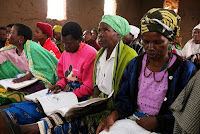She stood nervously in front of the microphone, paper in hand, smiled politely at the guests of honour and began reading her story. A year ago this would not have been possible for Ms. Banda*, sure she was able to speak but never did she dream of being able to write a story and then read it perfectly before a large crowd of people, her voice booming confidently through the speaker system. She told of her literacy
 journey, how she attended Adult Literacy classes and about her new found confidence in being able to read and write and perform basic sums. Ms. Banda’s simple act of reading directly from her hand written notes was a perfect symbol of the transforming power that being literate is having in the lives of many adults in Malawi.
journey, how she attended Adult Literacy classes and about her new found confidence in being able to read and write and perform basic sums. Ms. Banda’s simple act of reading directly from her hand written notes was a perfect symbol of the transforming power that being literate is having in the lives of many adults in Malawi.Yesterday, ADRA Malawi attended the commemoration of World Literacy Day in Phalombe District. This year’s theme “Literacy and Peace” saturated the large school ground at which the program was being held. Coordinated by ActionAid in partnership with UNESCO it featured speeches written and read by women who were once illiterate, dances, music and dramas promoting the importance of literacy, and speeches by the guests of honour- District Commissioner Emmanuel Banda, Principle Secretary for the Ministry of Education John Bisika and Executive Director of UNESCO Malawi, Dr.Mkandawire.
This year’s theme Literacy and Peace represents the importance of literacy in upholding human rights and creating greater understanding and appreciation for issues concerning development. In a statement made by the Director-General of UNESCO, Irina Bokova she states that, “Lasting peace is founded on a respect for human rights and social justice. Literacy, the foundation of all education and lifelong learning, is one of these rights. [It] is a prerequisite for peace because it carries multiple benefits, cutting across human, cultural, social, political and economic spheres.” (Quote taken from: http://unesdoc.unesco.org/images/0021/002113/211318e.pdf Literacy for Peace pdf, pg.1).
Of the 13 million people living in Malawi, 4.6 million are illiterate. The District of Phalombe has the highest illiteracy rate of the country with 38% of the 360,000 people living in Phalombe being illiterate. Giving greater significance for the location at which the program was held. The program aimed to promote to the local community and leaders, of which at least 800 were in attendance, the importance of literacy and to show how beneficial being literate is to improving livelihoods. It was also as an opportunity to express publicly, Malawi’s commitment to reducing the illiteracy rate by 50% by 2015.
 So far “3,021 students are enrolled in adult literacy classes, [in Phalombe] and this year 239 students graduated from the program (it is estimated that there are 8000 classes country wide),” says the District Commissioner Emmanuel Banda, “[if Malawi continues to increase adult literacy classes] using the REFLECT approach it will also assist children in school through the encouragement of their parents, who will see the importance of education. Literacy will also help to increase participation in and understanding of development issues, such as family planning [which will improve people’s livelihoods].”
So far “3,021 students are enrolled in adult literacy classes, [in Phalombe] and this year 239 students graduated from the program (it is estimated that there are 8000 classes country wide),” says the District Commissioner Emmanuel Banda, “[if Malawi continues to increase adult literacy classes] using the REFLECT approach it will also assist children in school through the encouragement of their parents, who will see the importance of education. Literacy will also help to increase participation in and understanding of development issues, such as family planning [which will improve people’s livelihoods].”ADRA Malawi has this year adopted the REFLECT approach to literacy in its Action for Social Change (AFSC) programme, Danida/ADRA Denmark and its Enhance Livelihood through Gender Empowerment (ELGE) project, SMC/SIDA/ADRA Sweden. Throughout the world the approach has proven to be highly effective compared to the Functional Adult Literacy approach which tends to be more academic, because it is practical and relevant, as it combines discussions of relevant community development and social issues with reading, writing and basic mathematical skills. For example, during a class the students might choose to discuss and learn about how to improve farming. Students will then discuss this topic and learn to read and write words that are associated to this topic and to perform calculations (where applicable). As the classes continue to meet the topics will keep progressing until each student is able to read, write and perform basic calculations fluently.
 ADRA Malawi is currently training REFLECT circle facilitators who will be responsible for facilitating REFLECT circle classes. AFSC programme has established 34 circles in 34 Group Village Heads and ELGE project has established 19 circles in 19 villages. Through this approach ADRA Malawi hopes to contribute to an increase in adult literacy and empowerment and ultimately improve the livelihoods of many community members.
ADRA Malawi is currently training REFLECT circle facilitators who will be responsible for facilitating REFLECT circle classes. AFSC programme has established 34 circles in 34 Group Village Heads and ELGE project has established 19 circles in 19 villages. Through this approach ADRA Malawi hopes to contribute to an increase in adult literacy and empowerment and ultimately improve the livelihoods of many community members.In his closing speech the Principle Secretary for the Ministry of Education said, “Let us all unite during this year’s theme of Literacy and Peace [to stamp out illiteracy in Malawi].” Together with Non-Government Organisations like ActionAid, ADRA Malawi is committed to improving literacy and peace through all its programmes/projects.
* not real name for privacy
No comments:
Post a Comment